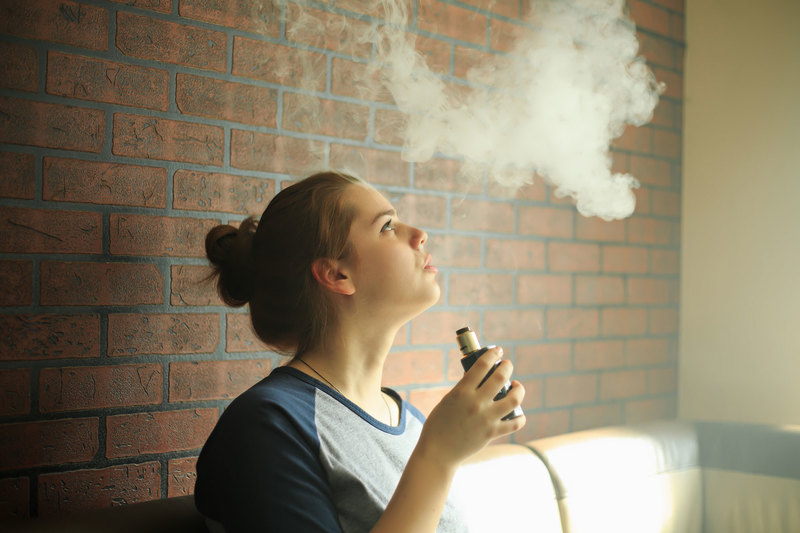Parents urged to be vigilant as vaping by adolescents rises
08 December 2023 | Story Mandisa Ndlovu. Photo iStock. Read time 5 min.
A recent study by the University of Cape Town (UCT) Lung Institute found that almost 7 000 learners vape, more than a quarter of them in Grade 12.
With the festive season in full swing, the Vapour Products Association of South Africa (VPASA) has raised concerns over the rising numbers of teenagers who are vaping and urged parents to be vigilant about their children’s behaviour.
Vaping is the inhaling of a vapour created by an electronic cigarette. E-cigarettes, or vape pens, heat a liquid until it becomes a vapour. The liquid can contain nicotine, marijuana distillate or oil.
More research is needed to understand what drives underage vaping, said VPASA chief executive Asanda Gcoyi. “However, as is the case with most undesirable behaviours in young people, widespread underage vaping may result from peer pressure, the temptation to try new things, general social stress and in some respects, accessibility of vaping products from unscrupulous vendors and social networks,” she added.
A recent study by the University of Cape Town Lung Institute found that almost 7 000 learners vape, with 26.5% of them in grade 12; 17.4% in grade 11; 13% in grade 10 and 10.8% in grade nine.
Examination periods are stressful, Gcoyi noted, adding that “while some may find solace in exercising or listening to music, an alarming number of learners are reportedly turning to vaping for stress relief”.
She urged parents to pay close attention to possible changes in their children’s behaviour for potential signs of nicotine addiction. Helping parents and schools educate learners and identify healthy ways of dealing with the stress associated with exam pressure is critical in curbing underage vaping, Gcoyi added.
“Some of the signs that a child may be vaping include an unfamiliar scent in the house, their bedroom or on the child. These scents can range from chocolate to a fruity scent. Also look out for an increased thirst due to a dry mouth, or equipment that may look like USB drives, cables or cartridges in the house or in their pockets,” she said.
Research shows that nicotine may affect brain development and, like all other risky behaviours, regulations should be implemented to restrict the sale of these products to anybody below the age of 18, Gcoyi noted.
She said the proposed Tobacco Products and Electronic Delivery Systems Control Bill in parliament should highlight the necessity of restricting adolescents’ access to these products.
“The support of our members is a positive sign towards conducting ‘responsible business’. Providing explicit punishment for vendors that sell to minors will also hopefully deter the sale of products to people under 18 years of age,” Gcoyi said.
The bill, which was proposed in 2022, aims to regulate the sale and advertising of tobacco products and electronic delivery systems. It also aims to regulate the packaging and appearance of these products to make provision for the standardisation of packaging; and to provide for the regulation of standards regarding their manufacturing and export.
Gcoyi said the VPASA and its retail members have agreed that the packaging of vaping products must contain accurate product information with vital warnings and advisories.
“Age restrictions must be clearly visible on the packaging and attention must be given to artwork choices. This means that the artwork featured on vaping products must not appeal to minors and must be devoid of popular animation movies or characters, childlike themes, and packaging that imitates popular sweets and treats,” she said.
The Democratic Alliance spokesperson on health, Michele Clarke, said although the Tobacco Bill might have the best intentions, it also fails to address the biggest problems with tobacco use, as seen during the Covid-19 pandemic.
“Unless the illicit tobacco trade is eradicated, the Tobacco Bill will hamper legal trade, but have very little impact on tobacco usage. The DA urges parliament to reconsider the Tobacco Bill,” Clarke said in a statement.
“It is clear that instead of unreasonable legislation, the focus needs to shift to the eradication of the illicit tobacco trade. Only once headway has been made in this regard, should new legislation be considered.”
Gcoyi said as the festive season approaches the collaboration between parents and retailers will be crucial in curbing underage vaping.
“By restricting sales to persons under 18, monitoring packaging and artwork choices, ensuring accurate product information, and harnessing the involvement of retailers and parents.”
Education Minister Angie Motshekga urged learners to stay safe and act responsibly in their celebratory moments after completing their exams.
“Now that the Class of 2023 is about to finish writing, we urge them to be safe. This may mark the end of the 12 years that you spent in the basic education sector, however, it is certainly not the end. Many of you are gathering in various places to celebrate the end of exams. As you do so, I urge you to act responsibly,” the minister said.
She asked parents to be on the lookout for their children and always know their whereabouts.
“May we always remember the tragedy of Enyobeni Tavern in the Eastern Cape, and many other such events, where the lives of young people were cut short, in incidents that could have easily been avoided.”










